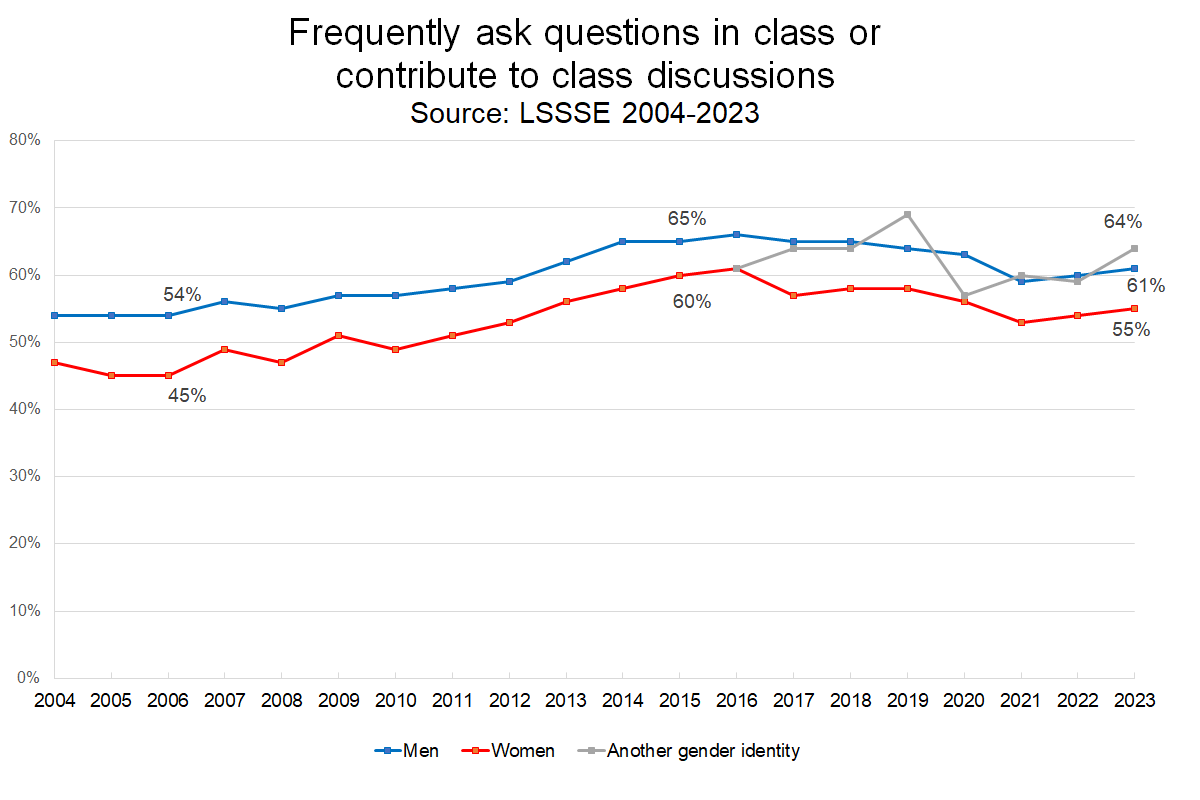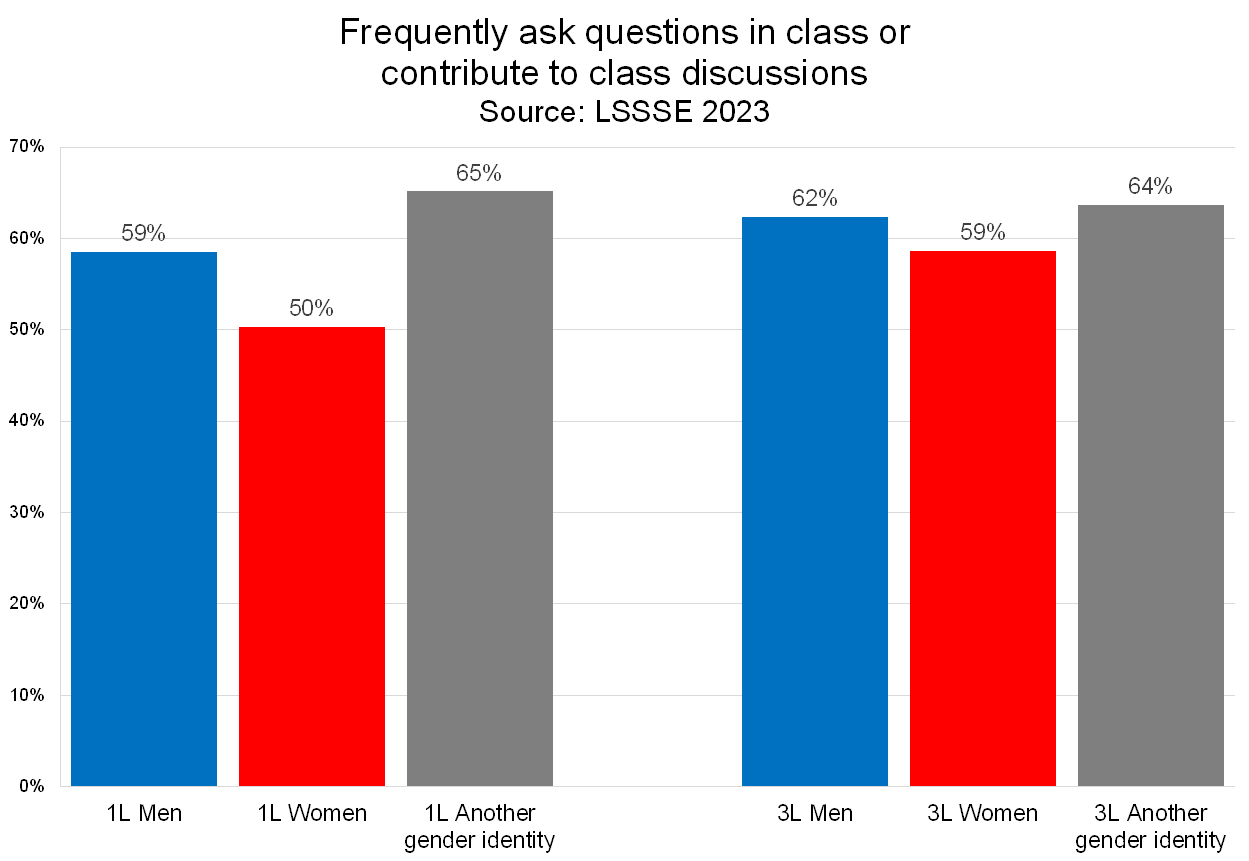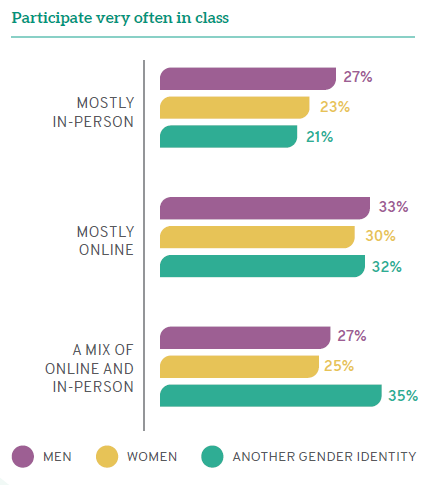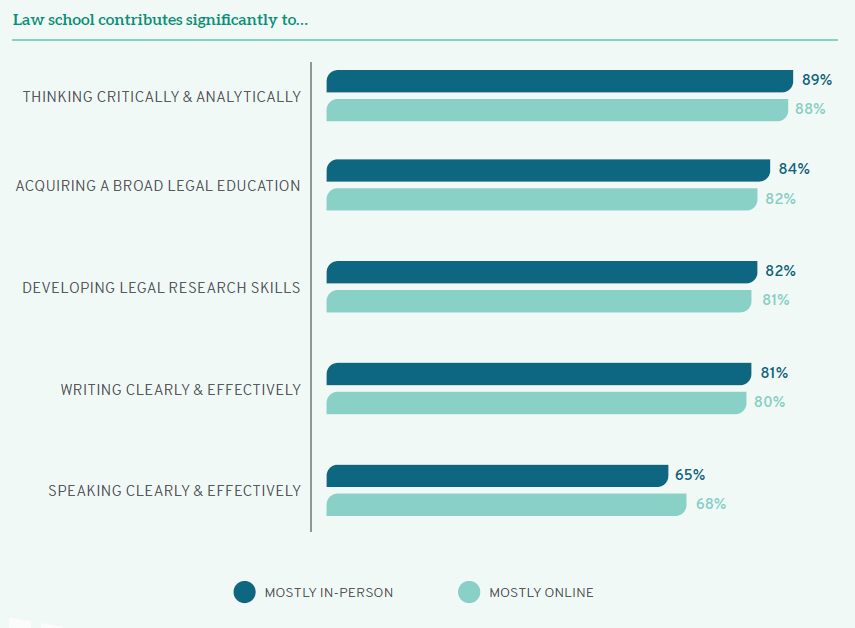Classroom participation by gender identity: 2023 update
In a 2018 blog post, we showed a long-standing pattern of class participation by gender among law students in which men engage more frequently in class discussions than women. Although the percentage of students who frequently ask questions in class or contribute to class discussions has fluctuated over time, the gap between men and women has stayed remarkably consistent since the inaugural LSSSE survey in 2004. How does this pattern look five years later?

Through a pandemic, a switch to online learning, and a switch back to in-person learning, the pattern has continued to be remarkably consistent. In 2023, 61% of male law students “often” or “very often” participated in class compared to only 55% of female students. Students of another gender identity also generally participate in class more often than women, with nearly two-thirds (64%) of them frequently asking questions or contributing to class discussions in 2023.
However, it appears that there are differences among classes in terms of participation by gender. 1L women are much less likely than 1L students of other genders to frequently ask questions or contribute to discussions, but 3L women are only somewhat less likely to do so relative to 3L students of other genders. Perhaps women gain confidence across their years as a law student or perhaps they become major contributors to class discourse only once they can be reasonably sure that their voices will be heard and respected.

Nonetheless, men and people of other gender identities are still slightly more likely to frequently ask questions or contribute to discussions even in that final year of law school. Finding ways to encourage women to participate in class conversations earlier will allow them to engage more meaningfully with their entire legal education in addition to elevating the discourse of the law classroom for all students.
Success with Online Education: Classroom Environment
Our last post shared some general findings about online learning from our 2022 Annual Results, Success with Online Education (pdf). In this post, we will share evidence that online classrooms appear to encourage a more diverse cross-section of students to participate in class discussions. We will also share reassuring signs that online law students are learning as much as their in-person counterparts.
Online discussions feature diverse voices
Online classes excel at inviting participation from a broader range of students than in-person classes. Men are equally likely to participate in class discussion and ask questions “often” or “very often” whether participating in person (60%) or online (61%). However, women taking mostly online courses are more likely to engage in class “often” or “very often” (58%) compared to women taking mostly in-person courses (53%). In fact, online courses appear to encourage all students to engage more intensely with class discussion. One quarter of students (25%) who take primarily in-person classes participate “very often” compared to 31% of students taking mostly online classes. There is a marked gender difference, with 23% of women participating “very often” in person but a full 30% participating “very often” online, and only 21% of those with another gender identity participating “very often” in person while 32% do so online. The online environment–perhaps because of the mechanisms for turn-taking or because it is more comfortable for students to volunteer– invites more voices to engage in the conversation.

Online students are learning as much as in-person students
Regardless of how they attend classes, most students are confident that they are developing crucial legal skills. Nearly 90% of online and in-person students are learning to think critically and analytically. More than four out of five online and in-person students say they are acquiring a broad legal education (82% and 84%, respectively) and developing legal research skills (81% and 82%, respectively). Interestingly, online students are more likely to be developing the ability to speak clearly and effectively, perhaps because online courses invite more participation from a diverse range of students. Thus, law school classes do not lose their intellectual rigor when they are offered in an online format.

Online law school classes can be highly successful and well-received by students. Many students who take most of their classes online are as satisfied—and sometimes more satisfied—than their peers who attend classes primarily in person. Furthermore, law students who attend classes via either modality are equally likely to feel confident that they are learning important skills that will help them succeed as legal professionals. Although the law school experience is unlikely to be primarily online again, the accelerated transition to offering online courses that occurred due to COVID-19 shows that the online law school experience can be as successful, enriching, and satisfying as the traditional law school curriculum.


